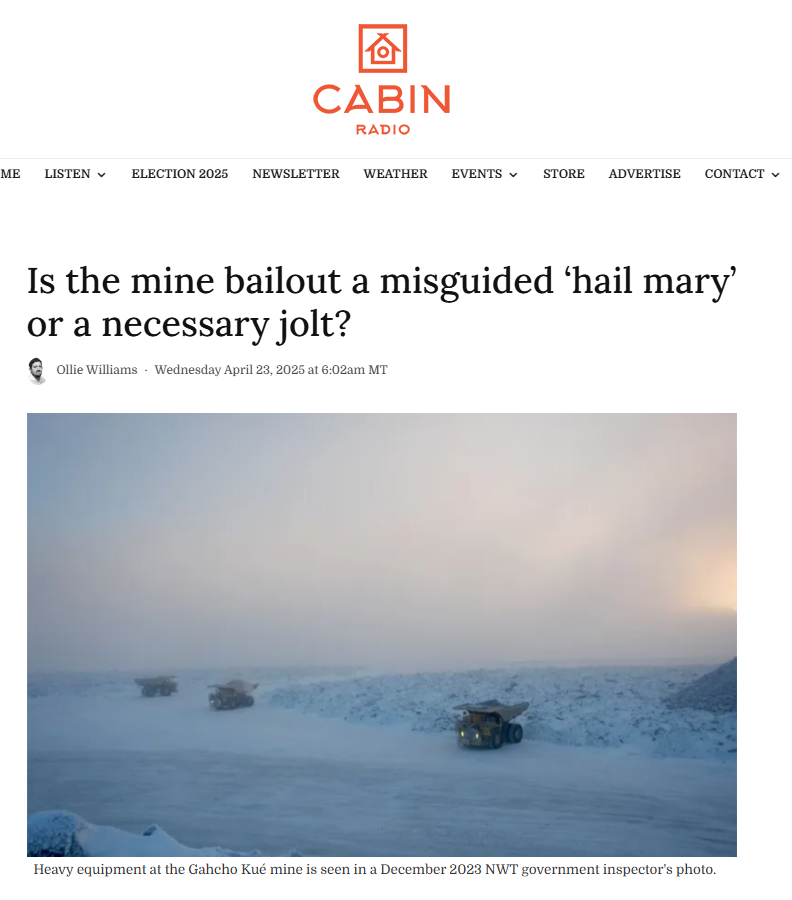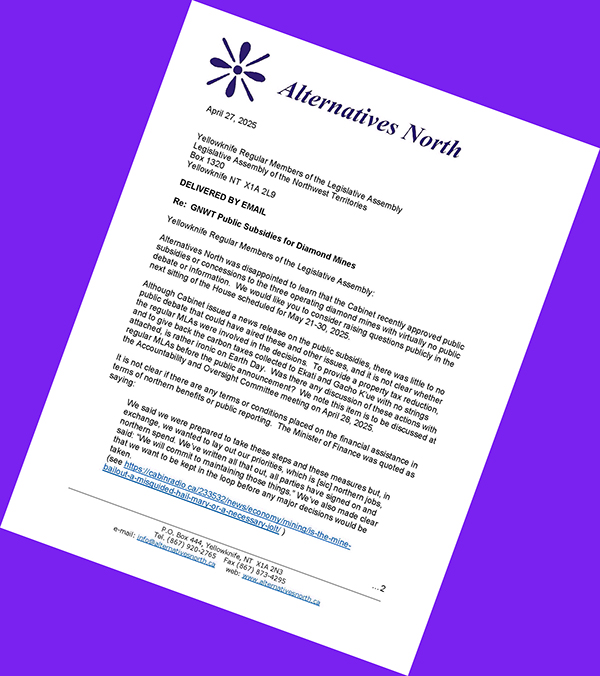To Yellowknife Regular Members of the Legislative Assembly:
Alternatives North was disappointed to learn that the Cabinet recently approved public subsidies or concessions to the three operating diamond mines with virtually no public debate or information. We would like you to consider raising questions publicly in the next sitting of the House scheduled for May 21-30, 2025.
Although Cabinet issued a news release on the public subsidies, there was little to no public debate that could have aired these and other issues, and it is not clear whether the regular MLAs were involved in the decisions. To provide a property tax reduction, and to give back the carbon taxes collected to Ekati and Gacho K’ue with no strings attached, is rather ironic on Earth Day. Was there any discussion of these actions with regular MLAs before the public announcement? We note this item is to be discussed at the Accountability and Oversight Committee meeting on April 28, 2025.
It is not clear if there are any terms or conditions placed on the financial assistance in terms of northern benefits or public reporting. The Minister of Finance was quoted as saying:

“We said we were prepared to take these steps and these measures but, in exchange, we wanted to lay out our priorities, which is [sic] northern jobs, northern spend. We’ve written all that out, all parties have signed on and said: ‘“We will commit to maintaining those things.” We’ve also made clear that we want to be kept in the loop before any major decisions would be taken.”‘
(see https://cabinradio.ca/233532/news/economy/mining/is-the-mine-bailout-a-misguided-hail-mary-or-a-necessary-jolt/ )
Is there an actual document that formalizes these arrangements? If so, why has it not been made public? Can you request that the Minister table it in the House in the interest of transparency and accountability? And what do these apparent agreements mean in the face of new realities on the value of mined diamonds and the potential for mine closures that may result?
It was noted that Anglo-American (owner of 85% of De Beers) and Rio Tinto are two of the largest and wealthiest transnational corporations in the world. Providing public subsidies to these corporations is bad public policy, especially when GNWT is facing dire fiscal constraints.
The subsidies are a clear demonstration of regulatory capture. GNWT has received significant authority over resources as a result of devolution but has not put in place appropriate measures to ensure transparency and accountability. For example, there is no lobbying or lobbyist legislation. The Cabinet practice of reporting outside meetings with Ministers does not provide a full or timely picture of the nature or extent of lobbying that takes place, or with members of the senior public service. Making decisions of this nature with public funds demands robust debate, yet we see little evidence of this.
We also wonder whether the expenditures to replace lost mining company profits would have been better invested in assisting workforce development such as worker retraining. The source of funds from the NWT’s budget for this financial assistance to the mining companies has not been identified.
We ask that you reflect on these issues and concerns, and that you raise questions in the House in the upcoming May-June sitting. Ministers were quoted in media on the public subsidies inviting vigorous debate. This is an opportunity to ensure there is greater transparency and accountability from Cabinet.
Thanks for your consideration, and please contact us should you have any questions or wish to discuss this further.
